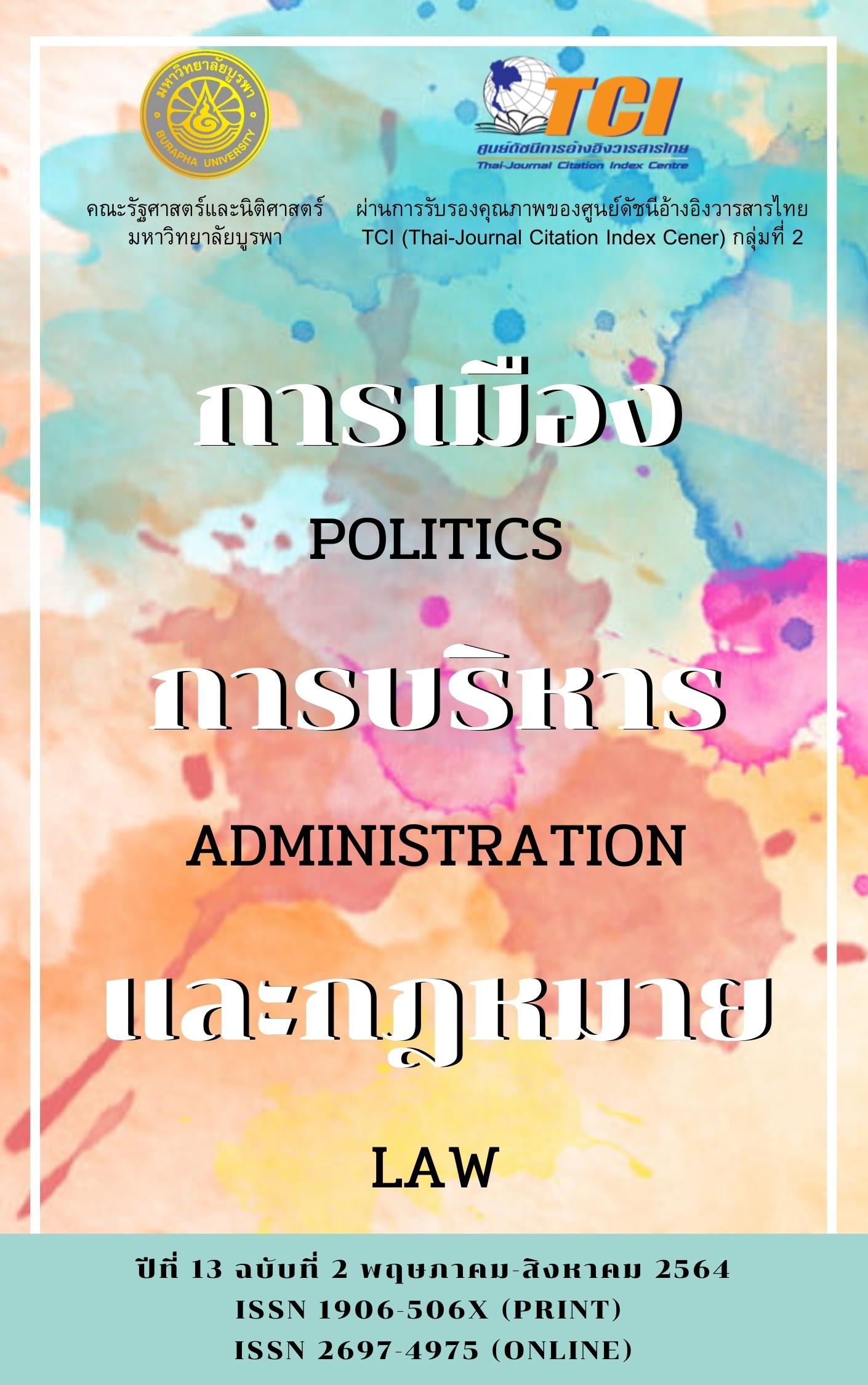Political Role of Councilor of Bangkok and District Councilor
Keywords:
Politics, Role, Councilor of Bangkok, District councilorAbstract
This dissertation is the research on the political role of Councilor of Bangkok and District Councilor. The research aimed to a) study the political role of Councilor of Bangkok and District Councilor b) to study the problems and obstacles of such political role and c) to recommend the potential guidelines for encouraging political role of Councilor of Bangkok and District Councilor for public utility by using qualitative research. Sampling groups were selected by purposive sampling, which are divided into 3 groups; (1) chief executive officer and relevant government officials, (2) local government officials (Councilor of Bangkok and District Councilor) and (3) community. The total participants are 33 persons. Semi-structure interview was utilized for data collection. The results of the present research were as follows: 1. The political role of Councilor of Bangkok and District Councilor coming from politicians directly elected by people was similar. As such, it was the role playing that would or would not be in accordance with the law. In the aspect of role playing according to the law, Councilors of Bangkok could perform their roles effectively because there was a system of check and balance within its managerial functions. Considering District Councilor, although District Councilor was directly elected from people and closely tight with people more than Councilor of Bangkok or District Director, District Councilor could not perform their role effectively due to the law restrictions. With regard to the role playing that would not be in accordance with the law, Councilor of Bangkok played the roles effectively. As such, Councilor of Bangkok cooperates with the administrative agencies to alleviate people suffering as a significant role via utilizing the number of legislative tools such as discussion, stipulating post or fiscal year budget legislation. While, the role playing, which was not in accordance with the law, of the District Councilor was to track the progress in management of director, to receive and track the progress of people petition within and beyond their areas of responsibilities, to attend social activities, and to coordinate budget allocation for developing the area under their responsibilities 2. Problems and obstacles in politics role of the Councilor of Bangkok and the District Councilor for public utility were similar. For example, the influence of political party, the influence of interest group, the relationship with Bangkok government official, the relationship with communities, and the personality of Councilor of Bangkok and District Councilor. 3. The guidelines for encouraging the politics role of Councilor of Bangkok and District Councilor for public utility. The guidelines were divided into 2 aspects, which were 1) role playing that was in accordance with the law and 2) role playing that was not in accordance with the law. Regarding the role playing according to the law, Councilor of Bangkok should be enhanced knowledge and understanding about the laws and relevant rules that had been used or newly promulgated, as well as case studies in order to make them more knowledgeable, competent and prudent in decision making for public utility. This in turn makes them to become the pertinent representative of general public in verifying administration and performing duty on legislation for the utmost benefits of public utility. Whereas, the role playing of District Councilor should be amended by increasing Councilor of Bangkok’ power of approval in case that the districts needed to withdraw central budget in the case of necessities and emergencies just like the small council. This was because Councilor of Bangkok was the representative of people coming from an election and worked closely tight with people. Considering the role playing that was in accordance with the law, Councilor of Bangkok should pay more attention on going into the area and attending the meeting or activities with districts and communities. With regard to District Councilor; the local people who were well understand people’s problems and livelihoods in that local area and therefore clearly seeing the whole picture of development, District offices should give importance on taking part in developing areas for the public utility. Therefore, it was critical to foster a relationship between the district director and the member of city councils. Moreover, Councilor of Bangkok and District Councilor should set the policy and work towards the same goal and direction, leading to the great contributions for people and the utmost benefits for public utility.
References
งามพิศ สัตย์สงวน. (2532). หลักมานุษยวิทยา. กรุงเทพฯ: เจ้าพระยาการพิมพ์.
พระราชบัญญัติระเบียบบริหารราชการกรุงเทพมหานคร พ.ศ. 2528 แก้ไขเพิ่มเติมถึง (ฉบับที่ 4) พ.ศ. 2550. (2550). วันที่ค้นข้อมูล 17 กันยายน 2559, เข้าถึงได้จาก http://www.bangkok.go.th/th/page
โภคิน พลกุล. (2528). หลักเกี่ยวกับการจัดระเบียบบริหารราชการ. รัฐสภาสาร, 33(8), 1-23.
สำนักนโยบายและแผนกรุงเทพมหานคร. (2542). จากเทศบาลสู่กรุงเทพมหานคร. กรุงเทพฯ: สำนักนโยบายและแผนกรุงเทพมหานคร.
สำนักนโยบายและแผนกรุงเทพมหานคร. (2548). รายงานประจำปี. กรุงเทพฯ: สำนักนโยบายและแผนกรุงเทพมหานคร.
อุไร อนันตสิน. (2559). บทบาทของสภากรุงเทพมหานครในการตรวจสอบการบริหารราชการกรุงเทพมหานคร. วารสารรัชต์ภาคย์, 11(24), 74-86.
Allport, G. W. (1964). Pattern and growth in personality. New York: Holt, Rinehart and Winston.
Berg, B. L. (2001). Qualitative Research Method for The Social Science. Needham Heights, MA: A Pearson Education Company.
Berkowitz, L. (1972). Social Psychology. lllinois: Scott Foresma.
Kluckhohn, R. (1962). Culture and behavior. New York: Free Press.
Manor, J. (1999). The political economy of democratic decentralization. Washington, D.C.: World Bank.
Mead, G. H. (1977). On social psychology. Chicago: University of Chicago Press.
Mintzberg, H. (1983). Power in and around organizations. Englewood Cliffs, New Jersey: Prentice Hall.
Nie, N. H., & Verba, S. (1975). Political Participation: in Handbook of Political Science. Massachusetts: Addison Wesley.
Patton, M. Q. (1990). Qualitative evaluation and research methods (2nd ed.). Newbury Park, CA: Sage.
Rosenbaum, W. A. (1975). Slaying beautiful hypotheses with ugly facts: the EPA and public participation. Paper presented at the annual meeting of the American Society for Public Administration. Chicago, LLL., April 2-5.
Shafritz, J. M., & Ott, J. S. (2005). Classic of Organization Theory (6th ed.). Belmont, CA: Thomson/ Wadsworth.
Verba, S. (1965). Political culture and political development. Princeton, N. J.: Princeton University Press.
Downloads
Published
Issue
Section
License

This work is licensed under a Creative Commons Attribution-NonCommercial-NoDerivatives 4.0 International License.






